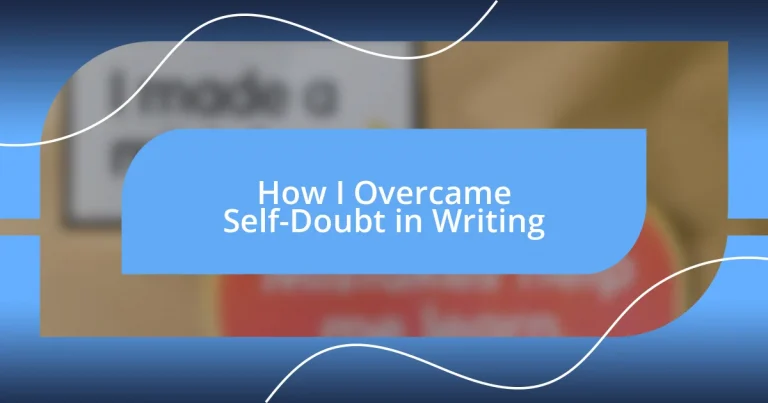Key takeaways:
- Self-doubt in writing is a common struggle, rooted in vulnerability and often alleviated by sharing experiences with fellow writers.
- Identifying triggers of self-doubt, such as comparisons and critical feedback, enables writers to develop strategies and regain confidence.
- Celebrating small writing achievements fosters a positive mindset and motivates writers to continue their creative journey.
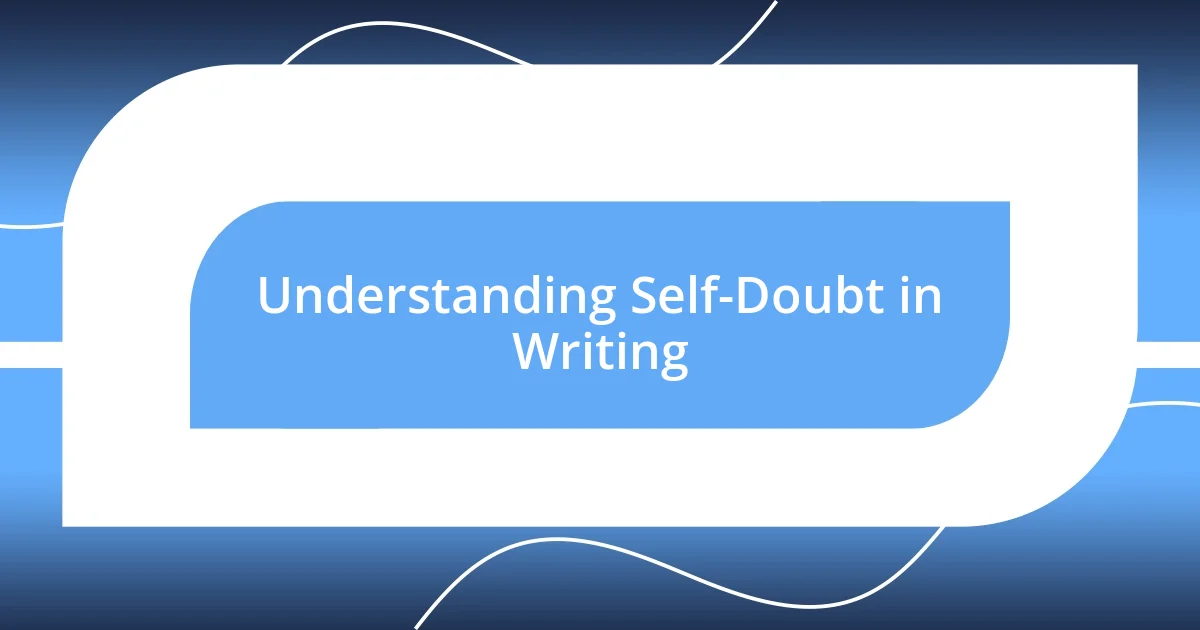
Understanding Self-Doubt in Writing
Self-doubt in writing often feels like an invisible barrier that keeps us from expressing our true selves. It sneaks in, whispering that our words won’t be good enough or that others will judge us harshly. I remember sitting in front of my blank screen, asking myself, “What makes me believe anyone would want to read what I have to say?” Those moments felt paralyzing, almost as if the weight of my thoughts was far too heavy to lift.
What I’ve come to realize is that self-doubt is deeply rooted in vulnerability. When we share our writing, we expose a piece of ourselves and invite opinions from others. I once shared a personal essay with a small group of friends and held my breath as they read it. The fear of their reactions loomed larger than I expected, but their encouraging feedback became a turning point. It made me wonder: why do we often underestimate the power of connection through our words?
Understanding that self-doubt is a common struggle among writers has been liberating. I often reach out to fellow writers, and we share our fears openly. It’s comforting to know I’m not alone in these feelings, and together, we unravel the doubts that bind us. This camaraderie not only lightens the burden but also transforms it into motivation, pushing us to write boldly rather than hide behind the insecurities.
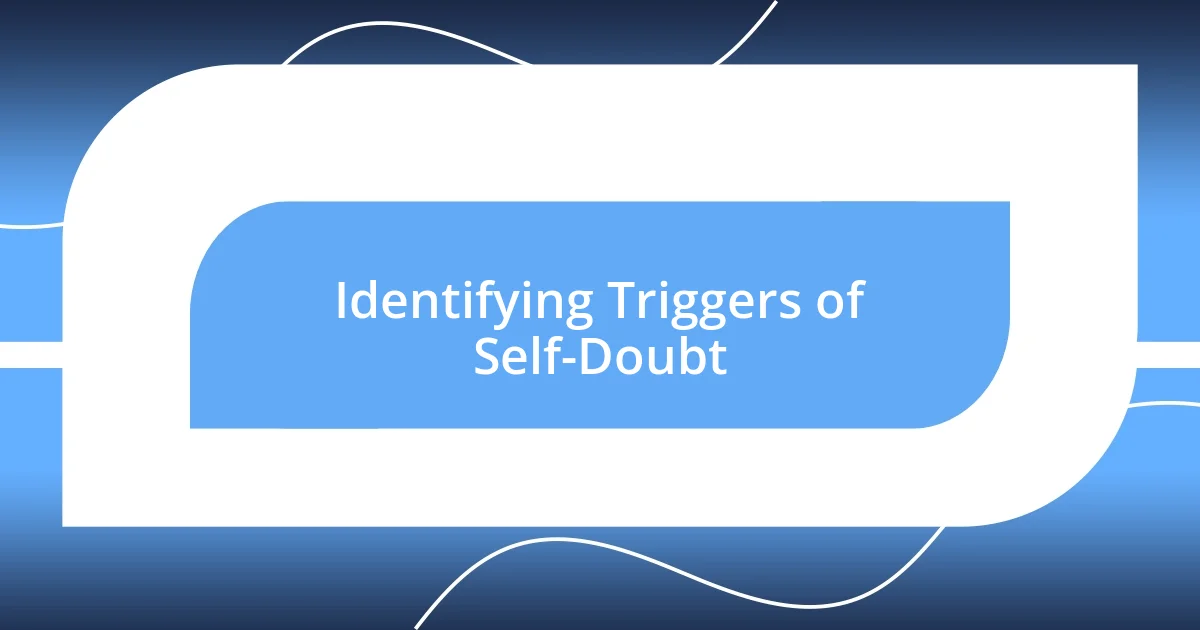
Identifying Triggers of Self-Doubt
Identifying the triggers of self-doubt is a crucial step in overcoming it. I noticed that my doubts often flared up during specific moments, like when I received critical feedback or when I compared my work to that of established authors. Instead of allowing these experiences to discourage me, I began to analyze them closely. I realized that these triggers often stemmed from external pressures or insecurities I had about my abilities.
To better understand my triggers, I created a list that helped clarify my thoughts:
- Comparisons to Other Writers: I would scroll through social media, feeling inadequate next to others’ polished work.
- Feedback Sessions: Receiving critical comments would send me spiraling into a “I’m not good enough” mindset.
- Imposter Syndrome: Moments where I questioned if I truly belonged in the writing community plagued me, making me doubt my qualifications.
- Perfectionism: The pressure to produce flawless content often left me frozen, fearing failure at each keystroke.
Acknowledging these triggers was a profound step. It allowed me to approach my writing with more awareness and to develop strategies for when those waves of doubt would crash over me. Understanding where my self-doubt originated helped me reclaim my confidence in writing.
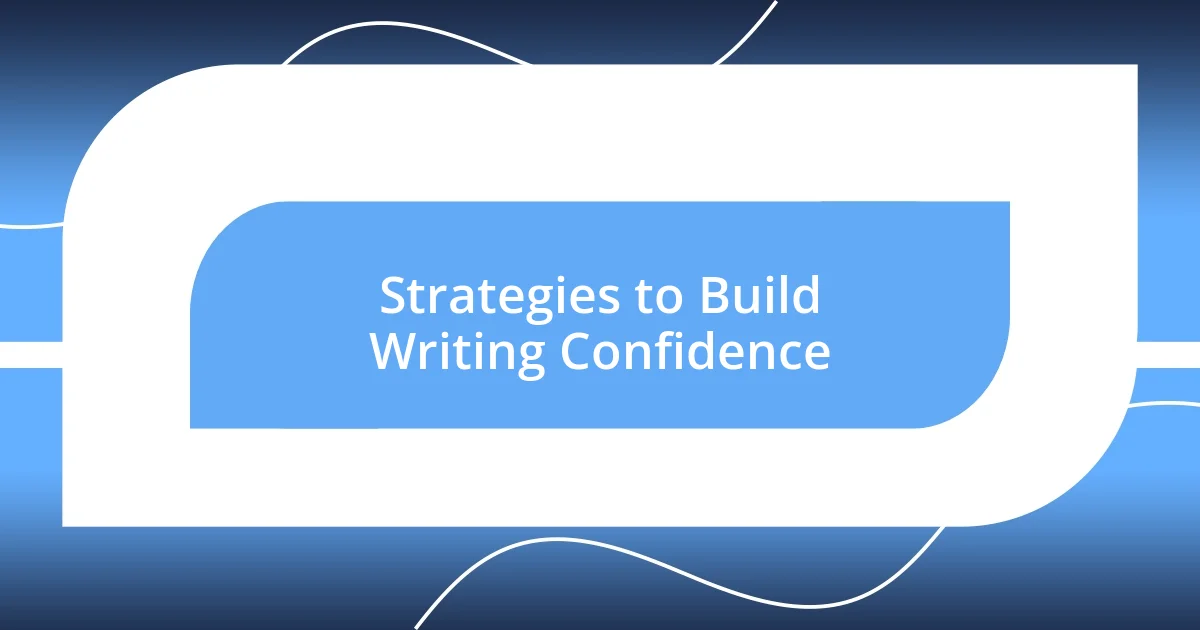
Strategies to Build Writing Confidence
Building confidence in writing is essential, and I’ve found that creating a consistent writing routine really helps. When I set aside dedicated time to write each day, it transforms writing from an intimidating challenge into a familiar habit. I can recall how at first, my daily sessions felt daunting, like stepping into the ring for a fight. But over time, showing up for myself and my words became a safe space where I could explore freely without judgment.
Another effective strategy is seeking constructive feedback. At one point, I decided to join a local writers’ group. Sharing my work with people who understood the struggle of self-doubt eased my anxiety. Their encouragement allowed me to view my writing from different perspectives, ultimately enriching my craft. I remember the first time I received positive feedback; it felt like a weight lifted off my shoulders. That experience reinforced my belief that vulnerability can lead to growth.
Lastly, celebrating small victories is key in this journey. I began to reward myself for completing each piece, no matter how small, which helped me recognize my progress. I would treat myself to a nice coffee after finishing a paragraph or share my accomplishments with friends. This habit of celebrating milestones, however tiny, shifted my focus from fear of failure to appreciation for my effort, fostering a more positive relationship with my writing.
| Strategy | Description |
|---|---|
| Establish a Routine | Setting daily writing time makes the process habitual and less daunting. |
| Seek Feedback | Joining a writers’ group provides supportive perspectives and encouragement. |
| Celebrate Victories | Recognizing and rewarding small achievements builds a positive mindset. |

Setting Achievable Writing Goals
Setting achievable writing goals has been transformative for me. I learned that breaking my larger writing aspirations into smaller, bite-sized tasks made a world of difference. Instead of aiming to write an entire novel, I focused on completing just one chapter at a time. Each small achievement not only felt manageable but also fueled my motivation. Also, have you ever noticed how accomplishing a tiny goal can light up your day? For me, finishing a single page often felt like summiting a mountain.
I vividly recall a time when I set a goal to write for just ten minutes each day. At first, it seemed too small to make an impact, but I quickly found that those ten minutes would often turn into thirty. This gradual approach helped build my confidence in those early stages of overcoming self-doubt. With each session, I realized that progress wasn’t measured by the word count but rather by my dedication to showing up regardless of the end result.
Additionally, I began mapping out weekly targets, giving myself flexibility to adjust as life unfolded. For instance, if I had a particularly busy week, I would shift my goal from writing a thousand words to simply jotting down a few ideas. It was a relieving shift; I learned that embracing flexibility didn’t mean I was failing. Instead, it enhanced my writing practice, allowing me to adapt while still feeling accomplished. Isn’t that a more graceful way to navigate the creative journey?

Seeking Feedback from Trusted Peers
Seeking feedback from trusted peers has been a game-changer in my writing journey. I’ll never forget the first time I nervously shared my work with a close friend who was also a writer. I held my breath as I awaited her thoughts, and when she offered not just critiques but genuine encouragement, it opened my eyes to how powerful support can be. It felt like she was holding a mirror to my efforts, reflecting both my strengths and areas for improvement in a way that was constructive rather than intimidating.
Over time, I realized that the right feedback isn’t just about pointing out flaws; it’s about sparking ideas and fostering creativity. One afternoon, while discussing a piece in a small group, a fellow writer suggested an angle I hadn’t considered at all. That one comment ignited a new passion in me for the story. Have you ever had a moment where someone’s perspective made everything click? I know that feeling well—it’s like discovering a hidden door to your story that opens up new possibilities.
I also learned to navigate criticism with a healthy mindset. When I first faced negative feedback, it stung, and I often questioned my abilities. But after stepping back and reflecting, I understood that each piece of advice was a stepping stone toward improvement. It’s essential to approach feedback with an open heart, as it can be a source of inspiration rather than a setback. Now, I actively seek out these insights because I’ve come to appreciate how they not only strengthen my writing but also boost my confidence.
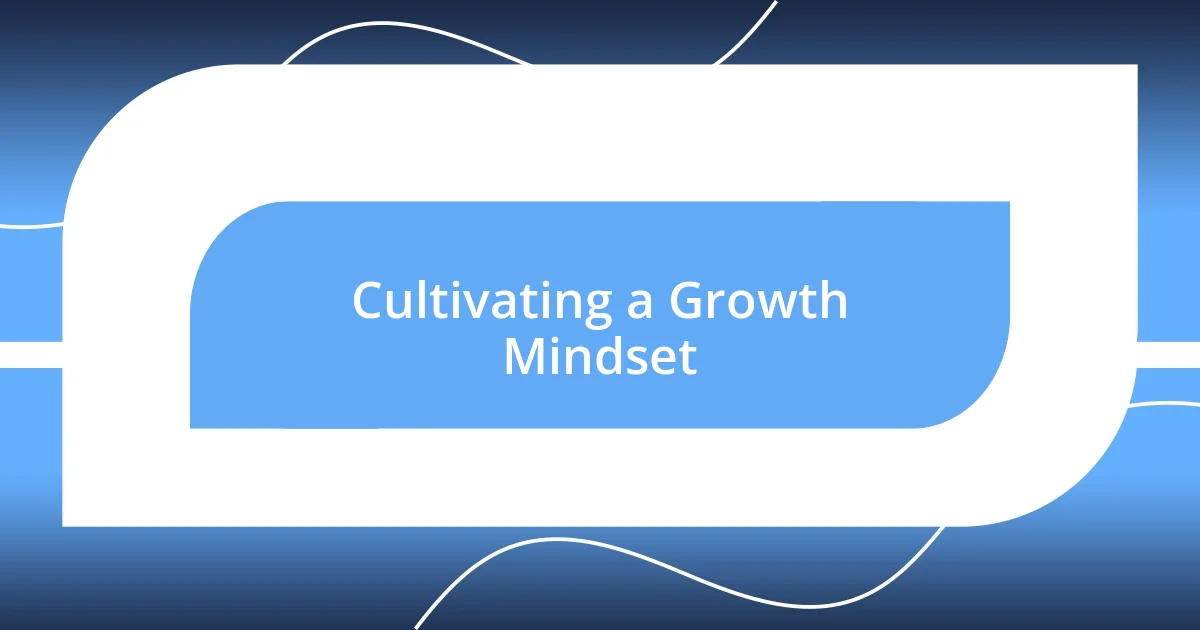
Cultivating a Growth Mindset
Cultivating a growth mindset has profoundly altered my approach to writing. I used to dread the possibility of failure, feeling paralyzed by the fear of judgment. But one day, during a writing workshop, a facilitator encouraged me to view every mistake as a learning opportunity. That shift in perspective was eye-opening. Instead of seeing criticism as a threat, I began to embrace it as a chance to refine my craft. Haven’t you ever wished to break free from the chains of self-doubt? Trust me, adopting a growth mindset can be the key.
Reflecting on my journey, I recall a period when I struggled with a particularly challenging piece. Every time I sat down to write, doubt crept in, whispering that I wasn’t good enough. But I challenged myself: what if I focused on the process rather than the outcome? I decided to relish the act of writing, no matter how clumsy it felt. Those messy drafts taught me that vulnerability is where the magic happens. I discovered that embracing imperfections allowed me to dig deeper into my ideas, ultimately leading to stronger writing. When was the last time you allowed yourself to be a beginner again?
This growth mindset also encouraged me to celebrate my evolution. I keep a journal where I jot down both my struggles and my victories. Recently, I revisited an old story draft I’d once deemed ‘hopeless.’ To my surprise, I found glimmers of potential that previously went unnoticed. I realized that every step, whether it seemed like a setback or not, was part of my journey. Recognizing these moments instilled a sense of gratitude for my growth, reminding me that every writer evolves at their own pace—and that’s perfectly okay. Isn’t it comforting to know that every writer feels like a novice at times?
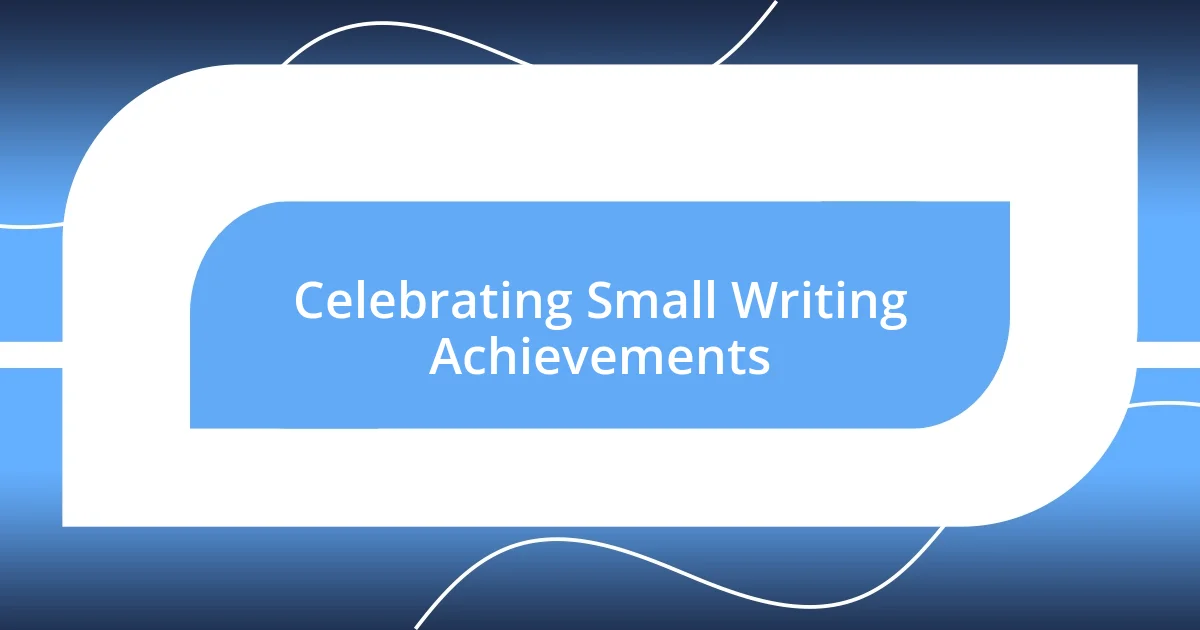
Celebrating Small Writing Achievements
Celebrating small writing achievements has transformed my perspective on progress. I remember the exhilarating feeling when I completed my first short story. It was just a few pages long, yet I treated it like an award-winning manuscript. I printed it out, treated myself to a nice coffee, and felt proud. Have you ever taken a moment to acknowledge the small victories in your own writing? Those little celebrations can ignite further motivation and remind us of how far we’ve come.
Each time I finish a writing session, I jot down what went well that day. Whether it’s crafting a meaningful sentence or simply showing up to write, each accomplishment counts. I recall one afternoon when I struggled with word choice, yet, after hours of revisions, I finally found the perfect line. The satisfaction of that moment felt monumental in my eyes. For me, it’s not just about the end goal but relishing each victory along the way. How do you celebrate the little things in your writing journey?
While it might seem insignificant, I found immense value in sharing these small wins with my writing group. I’ll never forget the collective cheer when I shared the news of completing my first article. The supportive energy around that moment propelled me to tackle even more ambitious projects. Celebrations don’t have to be grand. They can be simple acknowledgments of effort and progress—something as small as a smile or a pat on the back can make a world of difference. So, how do you make sure to pause and recognize your efforts? Each of these small achievements lays the groundwork for greater confidence, encouraging us to keep writing.












